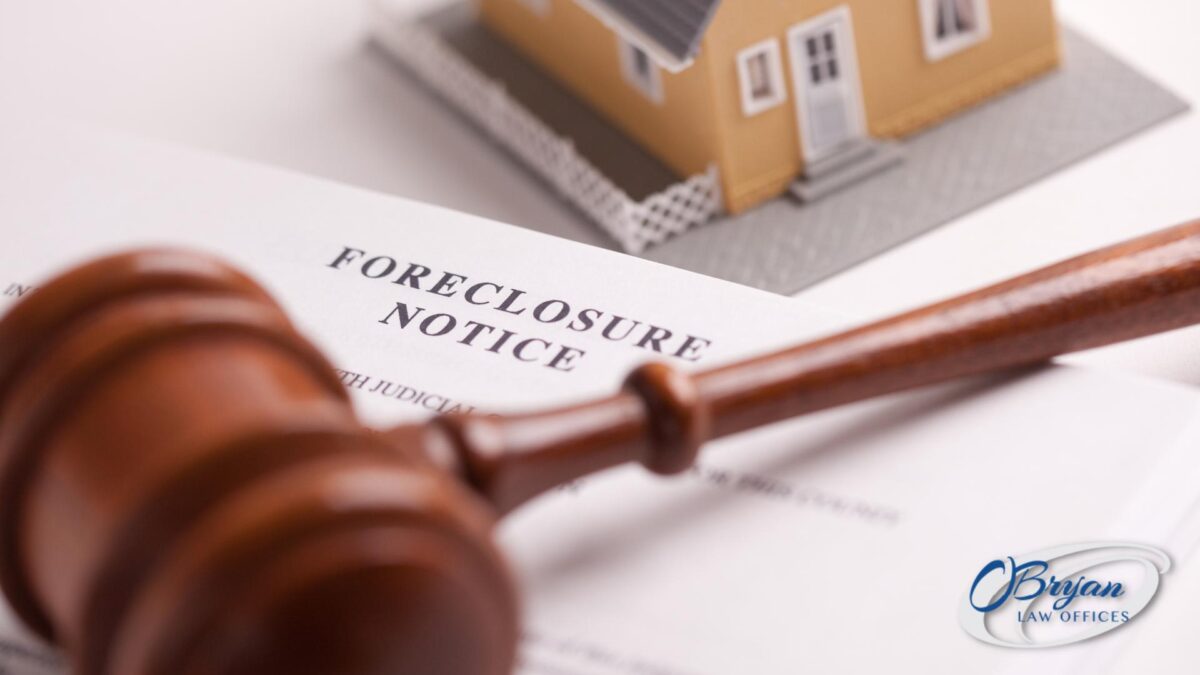Your home is not just a place of shelter; it’s often your most significant investment and a symbol of security. However, in the complex world of finance and legalities, there are circumstances where individuals might find themselves asking a troubling question: Can someone put a lien on my house without me knowing?
In this blog post, our Kentucky bankruptcy attorneys will explain the intricacies of property liens, explore the circumstances in which they can be placed on your house, and discuss how O’Bryan Law Offices can assist you in safeguarding your home and financial interests.
If you have questions about a property lien, call O’Bryan Law Offices at 502-339-0222 for a free consultation.
What Is a Property Lien on a House?

A property lien on a house is a legal claim placed on a property to secure an unpaid debt. It serves as a way for creditors or parties with claims against the property owner to protect their interests. When a lien is placed on a house, the property cannot be sold or transferred without satisfying the debt or obligation associated with the lien. There are various types of property liens, including mortgage liens, tax liens, judgment liens, and mechanic’s liens. They each serve different purposes.
If the owner fails to address the underlying debt, the lienholder may have the right to initiate legal proceedings. These proceedings could include foreclosure to enforce their claim and potentially take possession of the property to satisfy the debt. The lien will remain in effect until the debt is repaid or the judgment expires. It’s important to note that mortgage payments must be paid before an owner can pay off any liens.
Types of Property Liens

Property liens come in various forms, each serving a unique purpose and arising from different circumstances. Understanding these types of liens is essential, as they can significantly impact homeowners and property owners alike. Whether you’re dealing with a mortgage lien, a tax lien, a judgment lien, or a mechanic’s lien, each has its own set of implications and legal requirements.
Voluntary Liens
Property owners willingly enter into voluntary liens. The most common example of a voluntary lien is a mortgage. When individuals or businesses purchase a home or property and require financing, they voluntarily agree to a mortgage with a lending institution. This agreement allows the lender to place a lien on the property as collateral for the loan. While voluntary liens may seem burdensome, they are crucial to securing financing and homeownership.
Involuntary Liens
An Involuntary lien is usually the result of legal or financial obligations the owner has failed to meet. Common examples of involuntary liens include tax liens, judgment liens, and mechanic’s liens. This type of property lien can pose significant challenges to property owners. They can lead to legal actions, foreclosure proceedings, or restrictions on property sale or transfer.
Judgment Liens
A judgment lien is a legal claim placed on a person’s real or personal property as a result of a court judgment. When someone owes a debt or has lost a lawsuit, and the court awards the creditor or prevailing party a monetary judgment, a lien may be filed to ensure the debt is satisfied.
This lien essentially serves as collateral, allowing the creditor to claim the amount owed by seizing and selling the debtor’s property if necessary. Judgment liens can impact a debtor’s ability to sell or refinance their property, as the lien must often be satisfied before any transfer of ownership can occur.
What Does a Judgment Lien Mean?
A judgment lien has several implications. It can hinder the debtor’s ability to freely sell, transfer, or refinance their property, as potential buyers or lenders may be reluctant to get involved while the lien exists.
It allows the creditor to initiate a legal process, such as forced sale or foreclosure, to collect the debt by selling the property and using the proceeds to satisfy the judgment amount. This means that the debtor’s property is essentially held as collateral until the debt is paid off, which can have significant financial and legal consequences for both parties.
Construction Liens
A construction lien, also known as a mechanic’s lien or a contractor’s lien, is a legal claim placed on a property by a contractor, subcontractor, or supplier who has provided labor, materials, or services for a construction or improvement project and has not been adequately compensated. Construction liens are designed to protect the rights of those involved in the construction industry and ensure they receive payment for their work.
When a construction lien is filed, it effectively encumbers the property, making it difficult for the owner to sell or refinance until the outstanding payment issue is resolved. Construction liens can lead to legal actions, including foreclosure if the debt remains unpaid.
Property Tax Liens
Property tax liens are legal claims placed on a property by a government authority, typically a local municipality or county when the property owner fails to pay their property taxes. These liens are a means for the government to secure the unpaid property taxes owed to support public services such as schools, roads, and emergency services. When a property tax lien is imposed, it grants the government the right to collect the outstanding taxes by selling the property at a tax sale if the owner does not settle the debt.
Property tax liens take precedence over most other liens, including mortgage liens, making them a potent tool for tax collection. For property owners, these liens can have serious consequences, including the potential loss of their property if their tax debt remains unpaid.
Who Can File Liens Against You?
Various parties can file liens against individuals or entities, depending on the circumstances and the nature of the debt or obligation involved. Some common entities or individuals that can file liens against you include:
- Creditors
- Government agencies, such as the IRS
- Contractors and suppliers
- Homeowners’ Associations
It’s important to note that the rules and regulations governing liens can vary from state to state, and the circumstances under which a lien can be filed may differ.
How Are Homeowners Notified of Liens on Their Property?

Homeowners are typically notified of liens on their property through a formal legal process that varies by jurisdiction and the type of lien involved. Common methods of notification include:
- Public Record: Most liens are recorded in public records. Homeowners can become aware of these liens by regularly checking public or property records, often accessible online or at the county recorder’s office.
- Certified Mail: In some cases, lienholders may be required to send a notice of the lien by certified mail to the homeowner’s last known address. This notice provides information about the lien, including the amount owed and the reason for the lien.
- Legal Documents: If a lawsuit was involved in creating the lien, homeowners may have received legal documents during the lawsuit proceedings, notifying them of the pending lien.
- Notices of Sale: For property tax liens, homeowners are typically notified through notifications of sale or auction to satisfy the unpaid taxes. These notices are often published in local newspapers or posted publicly.
- Lien Release: Homeowners may also receive a notice of lien release when the debt associated with the lien has been paid off or resolved. This notice confirms that the lien has been removed from the property.
Homeowners must stay informed about their property’s status and regularly check for potential liens, as failure to address them can lead to legal complications and loss of property rights.
How to Check for Liens Against Property
Checking for liens against property is necessary for any homeowner or prospective buyer to safeguard their interests. To do so, follow these steps:
- Visit the County Recorder’s Office: Start by visiting the county recorder’s office in your property’s jurisdiction to conduct a municipal lien search. The county recordings office maintains public records, including property, liens, and deeds. You can access these records in person or sometimes online through the county’s official website.
- Request a Property Report: Ask the county recorder’s office for a property report or abstract of title. This report will list any liens, encumbrances, or legal claims against the property.
- Examine the Property Deed: Review the deed to check for existing liens. Liens are often recorded alongside property deeds, and the information will indicate if there are any debts associated with the property.
- Consult with a Title Company: Consider enlisting the services of a title company, especially when buying a property. Title companies conduct comprehensive title searches to identify liens, easements, or other issues that may affect the property’s title.
Regularly checking for liens on a property is crucial for homeowners to promptly address any outstanding debts or legal claims. This diligence is essential for buyers to avoid unexpected complications and ensure a clean title when purchasing a property.
What to Do If You Learn of a Lien on Your Property

If you learn of a lien on your property, start by contacting the lienholder or their representative to understand the nature of the lien and the outstanding debt. If the lien is valid, work on resolving the debt through negotiation or payment arrangements. Once the debt is settled, request a lien release document from the lienholder.
Next, ensure the lien release is recorded with the county recorder’s office to remove the lien from your property’s title officially. If you believe the lien is erroneous or invalid, consult with a real estate attorney to contest it through legal means.
If you’ve recently learned about a lien on your property, the attorneys at O’Bryan Law Offices can help you find the best option to resolve your debt.
What to Know About Lien Priority
Lien priority is a critical concept in real estate and finance, influencing the order in which creditors or claimants are entitled to proceeds from the sale of a property in the event of default or foreclosure. It determines who gets paid first and who might be left with unpaid debts.
Liens are categorized as senior and junior liens. Depending on the category the lien falls under will determine the payment order of the debts.
Junior Liens
Junior liens, often referred to as subordinate liens, are legal claims or encumbrances on a property that hold a lower priority than other liens or debts associated with the property. These liens come into play when there are multiple claims on a property, with senior liens taking precedence over junior liens.
Junior lienholders are only entitled to receive payment after the senior lien holders have been satisfied in full. Examples of junior liens include second mortgages, home equity lines of credit (HELOCs), and some judgment liens. While junior lienholders may face a higher risk of not recovering their full debt if a property is sold or foreclosed upon, they often have higher interest rates to compensate for their increased risk.
Senior Liens
Senior liens are typically established before any junior liens or subordinate claims and take precedence in the event of foreclosure or property sale. So, senior lien holders are the first to receive payment from the proceeds of a property sale, and only after they have been fully satisfied will junior lienholders and other claimants receive any remaining funds. Common examples of senior liens include the primary mortgage on a property and property tax liens. Senior lienholders often have greater security given their top position in the hierarchy. They are more likely to recover their debts in full if the property is sold or foreclosed upon.
Contact a Kentucky Foreclosure Defense Lawyer at O’Bryan Law Offices

Choosing the right legal representation during foreclosure proceedings can make all the difference in protecting your home and financial future. At O’Bryan Law Offices, our experienced Kentucky foreclosure attorneys offer a unique blend of experience, dedication, and personalized service.
We have a proven track record of helping homeowners find viable solutions and avoid the devastating consequences of foreclosure. Our team is committed to safeguarding your rights and providing peace of mind during challenging times.
When you choose O’Bryan Law Offices, you choose a partner dedicated to your best interests. We will ensure you receive the guidance and support needed to navigate the Kentucky foreclosure process successfully. To schedule a free consultation with one of our foreclosure attorneys, call 502-339-0222 today.







